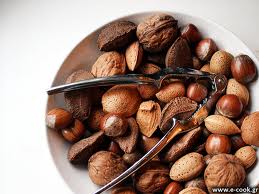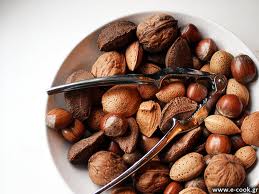By Andris Vassilios:
Nuts are a misunderstood food category, most of them avoid them as they are harmful or fattening. But the truth is that they are an excellent and delicious snack that contains all the macronutrients and a variety of other ingredients necessary for our body. They have a positive impact on our lipid profile, lowering total and LDL-cholesterol, but also triglycerides and increasing HDL-cholesterol. Consumption of nuts at least 2 times a week reduces by 47% the risk of developing cardiovascular and by 30% the risk of developing coronary heart disease.
More specifically, as part of a balanced diet, nuts are a very good source of calcium, phosphorus, zinc, folic acid, copper, selenium, magnesium, carbohydrates, proteins, vitamins A and E, and omega-3 fatty acids.
Indicatively, we mention the beneficial action of some ingredients:
Vitamin E: It is a powerful antioxidant that neutralizes free radicals, strengthens the body's defenses and helps dilate blood vessels and helps prevent blood clotting in them.
Folic acid: Important for preventing the increase of homocysteine levels in the blood, improving the circulation and the formation of red blood cells. It also helps in the normal neurological development of the fetus.
Magnesium: Participates in the control of blood pressure. Helps maintain normal function of the muscular and nervous systems, strengthens the immune system and contributes along with calcium to have strong bones.
Proteins: They are a structural component of muscles. In particular, walnuts and almonds contain 6g. protein, while peanuts have the highest amount of protein, since 1/3 of a cup is equivalent to 12g. protein, ie about 1/5 of the recommended daily allowance.
omega-3 fatty acids: They contribute to the proper functioning of the arteries and prevent the formation of clots. Therefore, they act as a shield against heart attacks and strokes.
Almonds
A handful of almonds (30g.) Yields 165 calories and contains 9g. monounsaturated fatty acids. Their cardioprotective action is also important, which is achieved due to components that contain, such as monounsaturated fatty acids, α-tocopherol (antioxidant), folic acid, calcium, potassium, magnesium, zinc and copper. Finally, eating almonds lowers triglycerides, total and LDL-cholesterol and raises HDL-cholesterol and is a source of fiber and vitamin E.
Hazel
They are rich in plant sterols, have a large amount of antioxidants (such as selenium and zinc), give a lot of magnesium, potassium, phosphorus, a little iron, as well as vitamin E. In fact, a handful of nuts give us as much vitamin E as half a cup of oil. Perhaps most important is their content of vitamin K, a vitamin that is mainly synthesized in the intestine, but nuts provide it in larger quantities. 30gr hazelnuts yields 175 calories.
Walnuts
They are one of the best sources of omega-3 fatty acids in nature. At the same time, the polyphenols contained in walnuts, in combination with omega-3 fatty acids, offer strong antioxidant protection, thanks to their ability to reduce LDL (bad) cholesterol levels. A handful of peeled walnuts yields 185 calories and contains 2,5g. omega-3 fatty acids. Finally, they contain folic acid, vitamin E and potassium, ingredients necessary for the health and proper functioning of our body.
Peanuts
Peanuts are an excellent source of B vitamins (niacin, folic acid, B3), thus contributing to skin health and boosting metabolism. They also contain a high amount of protein and plant sterols, which enhance the body's antioxidant protection. A handful of peanuts is equivalent to 160 calories.
Stragals
The straws do not have much fat. It is a good source of protein, but also carbohydrates. It is impressive that two handfuls of straws correspond to 1 serving of lean meat and 1 serving of spaghetti. They also contain a lot of fiber and have an advantage over other nuts in vitamin A and β-carotene, vitamins necessary for cell regeneration. It is also very rich in vitamins K and C.
Cashews
Cashews, in addition to being a very tasty snack, are also a powerful weapon against cancer, thanks to the antioxidants they contain.
Apart from that, it is also a good source of nutrients, necessary for the good health of the organism. These nutrients are iron, zinc and magnesium. Rich in protein, they contain saturated fats (which increase cholesterol when eaten in large quantities).
Pasatempo
Passatempos contains the valuable omega-6 fatty acids and mainly linoleic acid. Sunflower seed is a food rich in phytosterols and therefore beneficial for the heart. It is very rich in folic acid. It is characteristic that 100 gr. Sunflower seeds give us more folic acid than recommended daily. The spores are also rich in fiber, iron and manganese.
If you want to maintain your weight, you can eat about a handful of nuts, 3 times a week (always depending on your body and needs), but counting these calories in your total daily calories. Prefer to buy nuts with their shell and clean them or at least buy them as fresh as possible, because their fats are easily oxidized by air and deteriorate over time. It is advisable to avoid salted, roasted and caramelized nuts, as these processes greatly alter their beneficial properties. You can eat nuts as an intermediate snack, put them in salads or add them to breakfast cereals and yogurt. Of course, never forget that nuts are generally a high calorie food, with 100g. to burn about 600 calories. Therefore, as beneficial to the body proves their consumption in moderation, just as harmful to weight and health can end up overconsumption!
Andri Vassiliou
Dietitian Nutritionist

